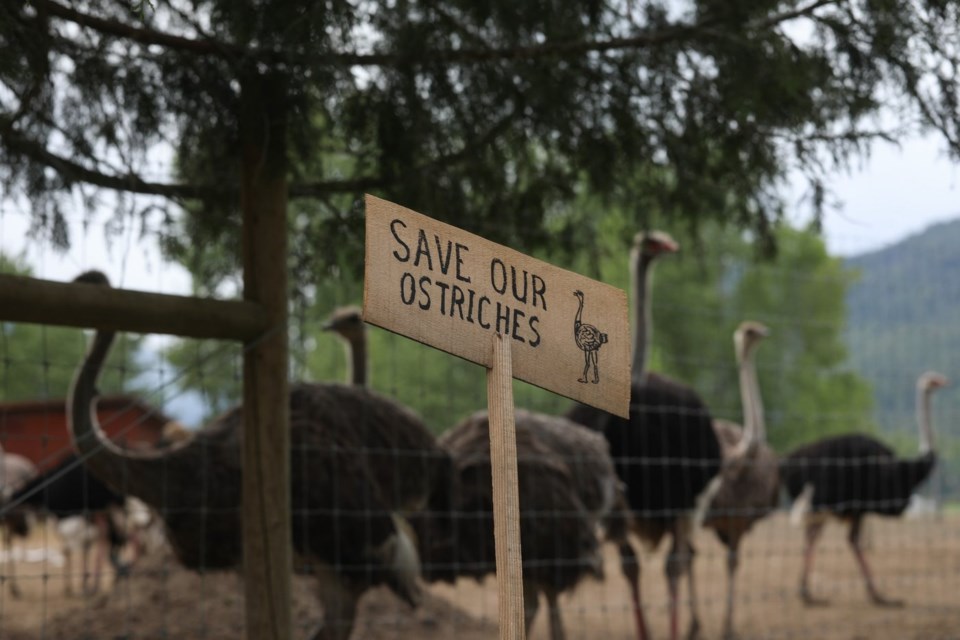OTTAWA — The Canadian Food Inspection Agency should treat ostriches differently than other poultry, the Federal Court of Appeal was told on Tuesday as two B.C. ostrich farmers try to prevent their entire flock of birds from being culled due to an avian flu outbreak.
The CFIA ordered Universal Ostrich Farms to cull about 400 birds after 69 ostriches died in December and January.
The agency tested two of the dead birds in January and found a "novel reassortment" of the highly contagious avian flu virus, which had not been seen anywhere else in Canada.
It also fined the farm's owners, Karen Espersen and Dave Bilinski, for failing to report the outbreak and for failing to adhere to quarantine measures.
The Federal Court denied the farm's application for a judicial review of the CFIA cull order, ruling that the agency's decision to order the cull was reasonable and procedurally fair, and noted that it is not up to the courts to resolve scientific disputes.
The case is now being heard on appeal. The courts have granted a stay of the CFIA's order to destroy the herd in the meantime.
The farm's lawyer, Umar Sheikh, told the Federal Court of Appeal that the agency ordered all the ostriches to be culled just 41 minutes after receiving the positive test results.
Sheikh said in his arguments Tuesday morning that there is evidence ostriches fare better in the case of an outbreak, with a lower mortality rate than chickens, for example.
At issue in the appeal is the CFIA's application of the "stamping out" policy, which is defined by the World Organization of Animal Health.
The policy states that if highly pathogenic avian flu is discovered, steps must be taken to destroy any animals or things on the property that were infected or exposed, and the environment must be decontaminated.
Sheikh said the CFIA is applying the policy in a one-size-fits-all manner and argued that is not appropriate, pointing out that no ostriches have died on the farm since January and the farmers believe all the birds have recovered.
Universal Ostrich Farms has said the loss of the herd would put their three-decade operation out of business.
The CFIA says the policy is a critical part of maintaining not only animal and human health, but also Canada's status as a reliable international trading partner.
The CFIA's lawyers argued in court that the agency made the decision to adopt the stamping out policy in 2004 in an effort to try to control the virus.
Because of that, they argued, the inspector who received a positive test at Universal Ostrich Farms didn't have discretion about whether to apply the policy.
The current outbreak of avian flu has been ongoing in Canada since 2021, the lawyers noted.
The Federal Court of Appeal heard that this case was believed to be the first time the stamping out policy was applied in Canada to ostriches, but the CFIA said ostriches were considered in the decision to adopt the policy.
CFIA considered an alternative approach that would involve testing individual animals and destroying only those that were infected, but decided not to adopt that approach after deciding it did not adequately address the risks to public health and trade.
Universal Ostrich Farms wants the agency to return to test the ostriches on the farm, and applied to the Federal Court of Appeal for permission to do its own independent testing. That application was denied.
The farm had also applied for an exemption to the cull order for animals with rare genetics because they are involved in research with Japanese and American researchers who are examining ostriches' immune systems. The CFIA denied that application on Jan. 10.
The agency said it was not provided with documentation, including active research trial logs or detailed research protocols, and said the farm is not suitable for controlled trials or research.
The case has garnered international attention, including from U.S. Health Secretary Robert F. Kennedy Jr. and TV personality Dr. Mehmet Oz.
This report by The Canadian Press was first published July 15, 2025.
Sarah Ritchie, The Canadian Press



